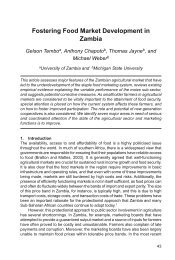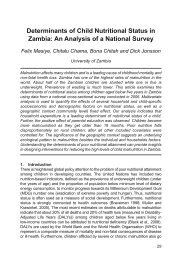Introduction to Basic Legal Citation - access-to-law home
Introduction to Basic Legal Citation - access-to-law home
Introduction to Basic Legal Citation - access-to-law home
Create successful ePaper yourself
Turn your PDF publications into a flip-book with our unique Google optimized e-Paper software.
decision shall also be identified. Textbook citations shall include the date of publication and<br />
the edition. Illinois statutes shall generally be cited <strong>to</strong> the Illinois Compiled Statutes (ILCS)<br />
but citations <strong>to</strong> the session <strong>law</strong>s of Illinois shall be made when appropriate. Prior <strong>to</strong> January 1,<br />
1997, statu<strong>to</strong>ry citations may be made <strong>to</strong> the Illinois Revised Statutes instead of or in addition<br />
<strong>to</strong> the Illinois Compiled Statutes.<br />
Indiana: Supreme Court citation practice | <strong>Citation</strong> rule(s)<br />
181<br />
Contents | Index | Help | < | ><br />
Examples from Healthscript, Inc. v. State, 770 N.E.2d 810 (Ind. 2002)<br />
. . . .<br />
Defendant filed a motion <strong>to</strong> dismiss, arguing that Defendant could not be charged under Ind.<br />
Code § 35-43-5-7.1(a)(1) for the acts that the State had alleged. Defendant also filed a motion<br />
<strong>to</strong> suppress regarding a search warrant, which Defendant contends was illegally obtained. The<br />
trial court rejected both claims and certified its rulings for interlocu<strong>to</strong>ry appeal. The Court of<br />
Appeals reversed the trial court's ruling on Defendant's motion <strong>to</strong> dismiss. See Healthscript,<br />
Inc., v. State, 740 N.E.2d 562 (Ind. Ct. App. 2000) (on rehearing).<br />
. . . .<br />
Reduced <strong>to</strong> its essentials, this is a case about whether a criminal statute, Ind. Code § 35-43-5-<br />
7.1(a)(1) (Supp. 1997), is sufficiently definite <strong>to</strong> put Defendant on notice that its alleged<br />
conduct was proscribed.<br />
. . . .<br />
The State alleged that Defendant charged between $ 22.50 and $ 25.00 per 9000 milliliters <strong>to</strong><br />
three other cus<strong>to</strong>mers while charging the Medicaid program $ 181.00 per 9000 milliliters.<br />
According <strong>to</strong> the State, the resulting payments exceeded $ 50,000. It was the State's theory,<br />
then, that Defendant did not comply with Ind. Admin. Code tit. 405 r. 1-6-21.1(g)(3) when it<br />
overcharged the Medicaid program; that this in turn violated Ind. Code § 12-15-21-1 because<br />
Defendant did not abide by its agreement <strong>to</strong> "comply with the ... rules governing [Medicaid];"<br />
and Defendant therefore committed a class C felony under the Medicaid Fraud Statute, Ind.<br />
Code § 35-43-5-7.1(a)(1), by submitting a claim in violation of Ind. Code § 12-15.<br />
. . . .<br />
We have held that the Legislature may constitutionally delegate rule-making powers <strong>to</strong> an<br />
administrative agency if that delegation is accompanied by sufficient standards <strong>to</strong> guide the<br />
agency in the exercise of its statu<strong>to</strong>ry authority. Barco Beverage Corp. v. Indiana Alcoholic<br />
Beverage Com'n, 595 N.E.2d 250, 253-54 (Ind. 1992) (quoting Taxpayers Lobby of Indiana,<br />
Inc. v. Orr, 262 Ind. 92, 103, 311 N.E.2d 814, 819 (1974)).<br />
. . . .




